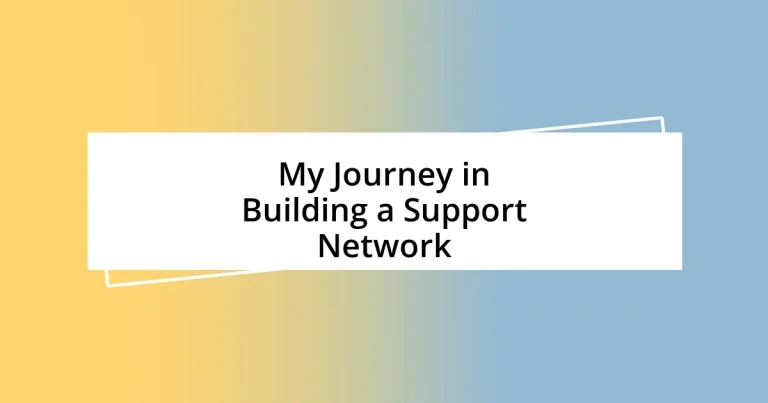Key takeaways:
- Building a support network requires understanding your specific needs—emotional, practical, and informational—and seeking out groups that foster authentic connections.
- Maintaining relationships demands intentional effort, like regular check-ins and shared activities, to keep bonds strong and vibrant over time.
- Celebrating both successes and challenges with your support network enhances connections, showcasing the importance of vulnerability and mutual encouragement.

Understanding the importance of support
Having a support network can truly transform the way we navigate life’s ups and downs. I remember a particularly challenging time in my career when I felt overwhelmed and isolated. It was a friend, who had been through similar struggles, who reminded me that leaning on others is not a sign of weakness but rather a profound show of strength. Doesn’t it feel good to know that someone understands your journey?
Support isn’t just about having people to turn to; it’s about creating a sense of belonging. I once attended a community gathering where I felt an instant connection with others who shared my experiences. Their encouragement lifted me in ways I hadn’t anticipated. Have you ever felt that rush of warmth when someone truly listens to you? That’s the essence of support—it’s a lifeline that can help us stay grounded in the face of adversity.
Think about times when you’ve been uplifted by others. Those moments aren’t just fleeting; they can serve as anchors during tumultuous times. In fact, research shows that social support positively impacts mental health and can even improve physical well-being. When I’ve experienced moments of joy or despair, sharing them with my network has always enriched those emotions, reminding me how invaluable it is to foster these connections. How different would your experiences be if you didn’t have that support?

Identifying your support needs
Knowing your support needs is vital in building a robust network. It requires a bit of introspection to understand what you truly seek from those around you. For instance, during a particularly stressful project at work, I realized that I needed not just moral support but also practical advice and guidance. It was enlightening to recognize that my needs were layered; I wanted empathy, but I also craved expertise that could help me tackle specific challenges.
To identify your support needs effectively, consider the following aspects:
- Emotional support: Do you need someone to listen without judgment?
- Practical help: Are there tasks you need assistance with, like planning or organizing?
- Information: Are you looking for insights or advice from those who have been there before?
- Encouragement: Would words of motivation help push you through tough times?
- Networking opportunities: Are you seeking connections that could lead to new paths or possibilities?
Making a list of these needs can clarify your journey, guiding you in selecting the right people to include in your support network. Remember, it’s okay to ask for different types of support depending on the situation.

Finding the right groups
Finding the right groups can often feel daunting, but it’s essential for fostering a truly supportive environment. From my experience, I learned that the places you choose to invest your time matter significantly. I once gravitated toward a group that seemed ideal on the surface—lots of networking opportunities and attractive events. However, I soon realized the conversations lacked genuine depth. It’s crucial to go beyond the surface; you want to find groups that foster authentic connection and understanding.
There are countless possibilities out there, and what works for one person may not necessarily work for another. During my journey, I joined a few different groups, from professional organizations to casual meet-ups, and each had its own vibe. I remember one particular group that centered around shared hobbies, which surprisingly ended up being the most fulfilling. Those connections flourished into friendships that provided emotional support outside our shared interests. Have you considered how the shared foundations of a group could impact your experience?
As I navigated the process, I realized that the best groups are those where I felt comfortable expressing vulnerability. I sought out spaces where people didn’t just share successes, but also their struggles and failures. This openness enriched my experience significantly. The right group becomes a sanctuary—where you’re encouraged to be your true self without fear of judgment. Ultimately, it’s about finding that sweet spot between camaraderie and authenticity, where you can grow together.
| Group Type | Characteristics |
|---|---|
| Professional Networks | Focused on career growth, often more formal, emphasizes networking. |
| Interest-Based Groups | Casual gatherings around hobbies, encourage shared passions and foster friendships. |
| Support Groups | Safe spaces for sharing challenges, often emphasize emotional and mental support. |
| Volunteer Organizations | Community-building, purpose-driven, promotes collaboration and connection through service. |

Building genuine relationships
Building genuine relationships is all about authenticity and vulnerability, and I can’t stress enough how important it is to create spaces where both can thrive. I remember attending a small gathering where the host encouraged everyone to share not just their successes but also their challenges. It was both refreshing and liberating to hear stories that resonated with my own struggles, reminding me that I wasn’t alone in my journey. This exchange forged deeper connections that went beyond the surface level, enriching my life in unexpected ways.
I’ve also learned that being intentional in nurturing relationships makes a significant difference. One of my closest friendships blossomed from shared moments of doubt and encouragement. We often text after a tough day, pouring out our thoughts without fear of judgment. It’s in these candid exchanges that I found a true ally. How often do we really take the time to invest in those kinds of honest conversations? They can transform a casual acquaintance into a trusted companion.
Moreover, it’s vital to surround yourself with people who uplift you, especially during challenging times. I once found myself in a tough spot, overwhelmed with personal issues, and it was my support network that rallied around me. Their genuine concern and willingness to listen made all the difference. I realized then that relationships thrive in that mutual give-and-take, where vulnerability is met with compassion. Isn’t it incredible how genuine relationships can fortify your spirit? They truly create a safety net of love and understanding that can carry you through life’s trials.

Maintaining connections over time
Maintaining connections over time requires a conscious effort, and I’ve learned this firsthand. There was a period when I got caught up in my busy schedule and unintentionally let friendships slip. I remember feeling a pang of regret when I realized I hadn’t spoken to one of my closest friends in months. It was a wake-up call that led me to prioritize regular check-ins, whether through a simple text or a scheduled call. Have you ever found yourself in a similar situation? It’s so easy to let life get in the way.
I’ve found that setting reminders for milestones—birthdays, anniversaries, or even just “thinking of you” notes—can nurture relationships effectively. A few years back, I started sending thoughtful messages to friends on significant dates. The reactions were heartwarming; many expressed how much it meant to them to be remembered. Those small gestures have a lasting impact, don’t you think? They serve as a gentle reminder that connection takes effort, but the rewards are immeasurable.
Also, engaging in shared activities not only deepens bonds but also keeps those connections vibrant. For instance, I initiated a monthly game night with a group of friends I wanted to keep close. Each session turned into a wonderful blend of laughter and light-hearted competition, rekindling the camaraderie we had built over the years. Have you ever tried something similar? It was a delightful way to make memories and ensure that we were still part of each other’s lives despite the chaos around us.

Utilizing online resources effectively
Utilizing online resources effectively has been a game-changer in my journey. I remember stumbling upon a vibrant online community dedicated to shared interests that resonated with me. It felt like uncovering a treasure chest of support and information, especially during times when I felt isolated. Have you ever found yourself scrolling through forums or social media groups, realizing that there are people out there experiencing similar struggles? It’s a comforting revelation that encourages us to reach out and connect.
During my quest, I learned the importance of curating my online spaces. I made a conscious effort to follow individuals and platforms that not only inspired me but also sparked meaningful conversations. I once participated in a virtual workshop hosted by a group of experts in my field. This experience opened my eyes; I not only gained valuable insights but also connected with fellow attendees who later became part of my support circle. Isn’t it fascinating how a single online event can lead to lasting relationships?
Moreover, leveraging digital tools like scheduling apps and collaboration platforms has made it easier to coordinate and foster connections. After I discovered an app that allowed me to set reminders for friend check-ins, it transformed how I maintained those relationships. I recall a moment when I used this tool to plan a virtual coffee date with an old friend, and we ended up sharing our life updates for hours. The ease of technology can help us bridge distances, don’t you think? It’s incredible how effectively we can cultivate our support network from the comfort of home.

Celebrating successes and challenges
Celebrating both successes and challenges is crucial in building a support network. I’ll never forget the thrill I felt when I secured my first speaking engagement. I reached out to my friends and colleagues to share the news, and their enthusiastic responses filled me with pride and motivated me to push even further. It’s moments like these that remind me how important it is to acknowledge achievements, no matter how small. Have you ever felt that instant boost from sharing a victory?
On the flip side, challenges also deserve recognition. I vividly recall a time when a project I poured my heart into fell short of expectations. Instead of sulking in silence, I chose to discuss it with my support network. Their perspectives not only offered comfort but also insights that transformed my way of thinking. It was a reminder that setbacks are often stepping stones. How often do we shy away from discussing our struggles with those we trust? I learned that vulnerability can lead to deeper connections.
Reflecting on this blend of triumphs and setbacks reveals the beauty of a supportive community. I’ve come to appreciate the role of celebration in my journey; whether joyous or challenging, every shared experience strengthens the ties that bind us together. I remember organizing a small gathering to celebrate not just my wins but also those of my friends, fostering an atmosphere of mutual encouragement. In the end, isn’t it these shared moments that truly enrich our lives?














